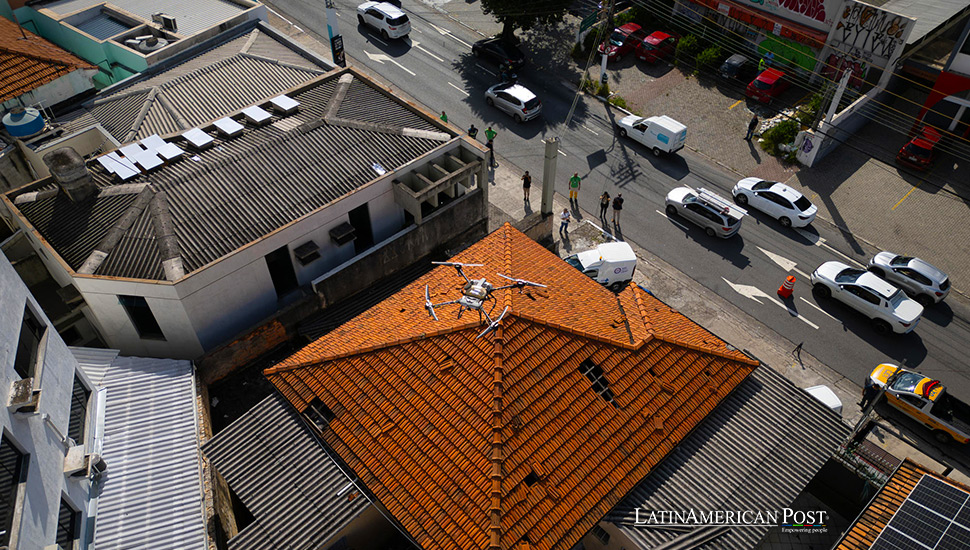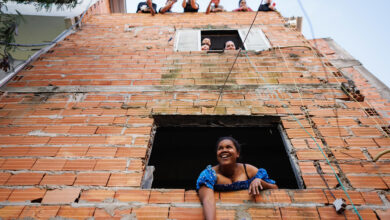Drones Take Flight in Brazil as Latin America Battles Dengue

As Latin America faces a surging dengue fever crisis exacerbated by extreme weather, Brazil’s innovative use of drones to identify mosquito breeding sites underscores the region’s struggle against this endemic menace. With vaccine supplies critically low, the outbreak reveals a stark vulnerability, urging a united, comprehensive strategy for prevention and containment.
Dengue Resurgence Amidst Environmental Challenges
As sweltering summer temperatures collide with relentless rains across Latin America, a familiar enemy rises – dengue fever. Brazil, grappling with a surge in cases, deploys drones to hunt mosquito breeding grounds. However, concerns loom about insufficient vaccine supplies, highlighting a regional vulnerability that demands a coordinated response.
Dengue fever, a mosquito-borne illness transmitted by the Aedes aegypti, isn’t new to Latin America. The region has a long and troubled history with this debilitating disease. Outbreaks have flared periodically for decades, often exacerbated by the ideal hot, humid weather and stagnant water breeding conditions. But the current situation in Brazil paints a particularly alarming picture.
The scorching summer and heavy rains have proven potent, fueling a surge in dengue cases. Sao Paulo, a sprawling metropolis, finds itself at the epicenter of the crisis. Here, the number of cases has skyrocketed, prompting the state to declare a health emergency. The specter of dengue isn’t confined to Brazil’s borders. Countries across Latin America report elevated caseloads, a grim reminder of the region’s vulnerability to this mosquito-borne menace.
Central America’s Vulnerability to Dengue
Mexico, grappling with its worst dengue outbreak in recent years, 2023, witnessed a surge of over 11,000 confirmed cases. Coastal regions popular with tourists, like Veracruz and Quintana Roo, bore the brunt of the outbreak, raising concerns about the potential impact on tourism-dependent economies. Central America is particularly susceptible to dengue due to its tropical climate and limited healthcare resources. Countries like Honduras, El Salvador, and Guatemala consistently report high caseloads, placing a significant strain on their already stretched medical systems.
The rise of dengue in Latin America is intricately linked to environmental factors. Climate change, with its unpredictable weather patterns and rising temperatures, creates ideal breeding grounds for the Aedes aegypti mosquito. Rapid urbanization, often accompanied by inadequate sanitation and overflowing drainage systems, further compounds the problem. Overcrowded living conditions also contribute to the spread of the virus, as the mosquito thrives near humans.
Faced with a spiraling dengue crisis, Brazil has turned to innovative solutions. Drones, equipped with advanced sensors, are deployed to scour urban landscapes in search of stagnant water – the prime breeding grounds for the Aedes aegypti mosquito. By identifying these hidden pools, authorities can take swift action to eliminate them, disrupting the mosquito life cycle and preventing the spread of the virus.
Vaccine Shortages Exacerbate Dengue Crisis
However, more than the reliance on drones alone is required. Health experts warn that the current vaccine supply is woefully inadequate to combat the rising tide of dengue cases effectively. Dr. Renato Kfouri, an infectious disease specialist with the Brazilian Immunization Society, paints a sobering picture. “Vaccination is a crucial tool in our arsenal against dengue, but the number of doses planned for the next five years simply won’t be enough to achieve significant control.” The current allocation – a mere six million doses this year, stretched out over five years for a vast population – pales compared to the number needed for widespread immunity.
The fight against dengue demands a regional approach. Latin American nations need to work together to share best practices and resources. Collaboration in research and development of more effective vaccines is crucial. Additionally, knowledge-sharing regarding vector control measures, including community engagement programs and efficient waste management strategies, can significantly benefit the region.
Public education campaigns informing citizens about mosquito bite prevention and eliminating breeding sites are essential for mobilizing communities to participate actively in the fight against dengue. Latin American governments can also consider regional stockpiles of crucial medical supplies, including rapid diagnostic tests and medications to manage dengue symptoms, to ensure a coordinated response during future outbreaks.
Also read: Brazil’s Escalating Dengue Crisis Leads to a Nationwide Emergency Vaccination Initiative
The current dengue crisis in Brazil is a stark reminder of the ongoing threat posed by mosquito-borne diseases in Latin America. While drone technology offers a glimpse into innovative solutions, a more holistic approach is essential. Increased vaccine access, intensified regional cooperation, and sustained public health initiatives focused on prevention and education are the cornerstones of building a future free from the debilitating grip of dengue fever. Only through a united front can Latin America hope to break the cycle of dengue outbreaks and safeguard the health and well-being of its citizens.





